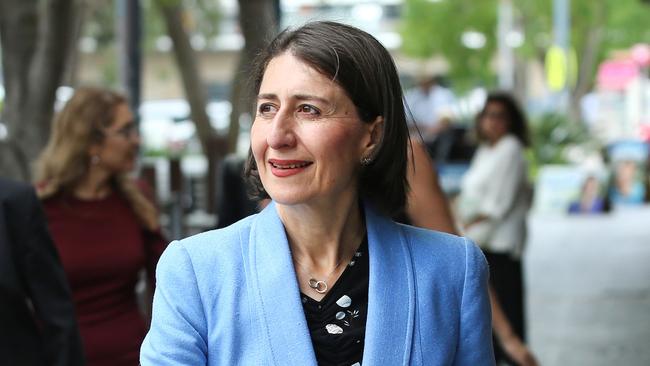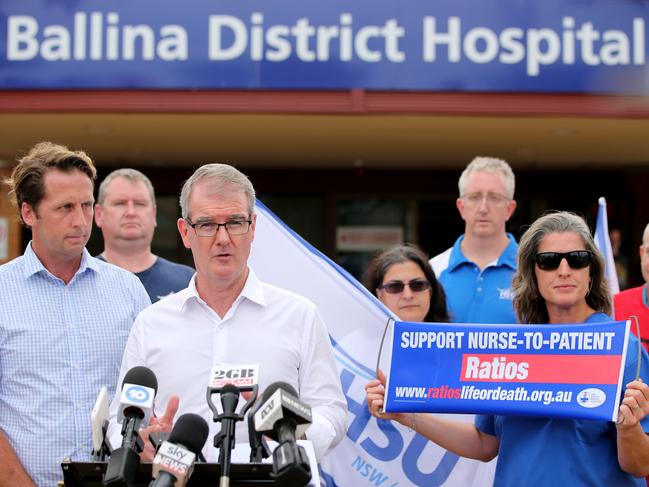Premier struggles to project her ‘authenticity’ to voters
Michael Daley’s Labor appears to be level pegging a week out from the NSW election.

Just a week out from an election that could end eight years in office, or set up four more, the Premier of Australia’s largest state says NSW voters will support “authenticity”.
Good on her. It’s a fine concept for any politician. Gladys Berejiklian also says “the public always gets it right”.
Presumably if voters choose the Labor opposition next Saturday ahead of her government, then Berejiklian will accept voters got it right and her reign was unauthentic.
How did it get to this point for a government with, on the face of it, a good story to tell voters? Berejiklian’s almost desperate pleas for voter support come late, after boasting about sound economic management and a massive infrastructure program to transform the state and guarantee its future.
Before stepping up to the top job, Berejiklian was NSW treasurer under her immediate predecessor, Mike Baird. She was transport minister before that under premier Barry O’Farrell.
Apparently voters don’t get it. Silly them for not recognising authenticity, according to the Premier’s logic, as opinion polls predict a hung parliament.
Berejiklian can still win next Saturday. She told Andrew Clennell, The Weekend Australian’s NSW political editor, that she knew “in my heart” she could score a majority.
Surely some of the message must be getting through, although the signals are now looking mixed when repeated talk of fiscal responsibility is matched by a growing tally of expensive election promises.
Berejiklian’s proposed spendathon in the campaign’s dying days has reached $28 billion.
As the Liberal Premier says proudly, unemployment in her state is the lowest in the nation at 3.9 per cent; the budget is back in surplus after years of pre-2011 deficits; government debt is slashed. The government is swimming in revenue from asset sales, and is using those funds to build roads and rail tracks.
So what’s not to like about this government?
Setting aside the frustrations of voters in many Western democracies, the Premier has a messaging problem.
Berejiklian has striven to deal with the bad news of her better-liked predecessor Baird.
She inherited Baird’s forced reversal of a ban on greyhound racing that had alienated a dedicated community, especially in regional areas.
She personally reversed forced local council amalgamations and a revamp of her government’s fire and emergency services levy that raised community angst by linking payments to the value of homeowners’ properties.
Most policy reversals were made early, leaving time for Berejiklian to capitalise on the positive aspects of what her government was doing, but it seems she has not. The polls tend to confirm that many voters regard the government she leads as arrogant and out of touch.
Berejiklian seems a sincere politician trying to do her best, but could she sell free ice creams? In public she has looked uncomfortable so often, including this week on the hustings. An inability to project undermines the “authenticity” Berejiklian wants voters to recognise.
It has not helped that NSW government extravaganzas such as the WestConnex tollway and Sydney light rail are only part-completed. Their construction phase has involved a lot of public inconvenience, damage to local businesses and uncertainty for homeowners in the path of bulldozers.
Planning decisions have changed, sometimes inexplicably.
If Berejiklian cares about drought-stricken regions and farmers doing it tough as she claims, the sentiment is not appreciated on the ground: her government could lose vital seats in the bush held by Coalition partner the Nationals.
One of Berejiklian’s strongest, yet most predictable, arguments in the last few weeks of the NSW election campaign has been to warn against a return to the state’s Labor government years of 1995 to 2011.
They ended badly, with economic mismanagement, corruption and a revolving door of premiers.
Eddie Obeid, serving time for his misdeeds, is a wonderful advertisement for Berejiklian’s claim that voters should not embrace Labor again anytime soon.
Yet it is not working, according to Newspoll results that make this election a 50-50 proposition.
Maybe NSW Labor has served its time in purgatory. Certainly, NSW Opposition Leader Michael Daley would say so.
Daley entered parliament in 2005, succeeding Bob Carr in his seat of Maroubra in Sydney’s south when Carr quit after just pipping Neville Wran’s record decade as a NSW Labor premier.

With politics focused these days on presidential-style leadership, regardless of our parliamentary system, Daley has proved to be a worthy rival to Berejiklian in the short time he’s been NSW Opposition Leader.
He was previously the low-key deputy to Luke Foley, whose leadership blew up in November over sexual harassment allegations. Before entering parliament, Daley was a Sydney-based in-house lawyer for the NRMA and mayor of Randwick Council.
He served as NSW Labor’s minister for roads, then held the police and finance portfolios.
Hardly anyone, even Liberal opponents, says Daley lacks the credentials or experience for higher office, even if there are doubts about his frontbench.
In earlier years, critics said Daley was lazy, even if he was considered a possible party leader one day. No one is calling him lazy now. After four months in the top job, Daley has campaigned non-stop to win the seats Labor needs, promising more funding for schools and hospitals.
Behind Daley and the NSW Labor machine is not only campaign money from unions that the Liberals wished they could match but some experienced professional campaigners.
They include Eamonn Fitzpatrick from Hawker Britton, an old hand from Morris Iemma’s NSW Labor government and a former adviser to Julia Gillard.
Now based in Brisbane, Fitzpatrick has been a strategist for the Palaszczuk Labor government. He helped Bill Shorten during the Longman by-election to re-elect Susan Lamb after the citizenship kerfuffle, and is expected to help Shorten again in the May federal election campaign, but his chief mission now is to help get Daley Labor across the line.
Another old hand in the wings is ex-Hawker Britton principal Bruce Hawker, who goes back to Carr’s days as NSW opposition leader in the early 1990s.
Such expertise, including advice about the right time to be bold, counterintuitive or not give a damn, could help Daley. It could wreck him too — if they were wrong — but Daley has demonstrated in the past week or so a willingness to break the political mould. While Gladys has mainly played her natural game — safe and defensive — Michael has taken on the formidable radio broadcaster Alan Jones, declared he would sack the Sydney Cricket Ground trust board and pledged to reverse the demolition of Sydney’s Allianz Stadium if elected.
Daley also gave his unequivocal support to yesterday’s school student strike demanding action on climate change. All of these moves, especially the last, would seem risky for the man who aspires to be the next premier of NSW in a week’s time.
But Daley is a man with nothing to lose. In four months he appears to have put NSW Labor in a winnable position. A minority NSW Labor government is now a realistic possibility, with the support of independents.
As Berejiklian keeps saying, voters will make the right decision.



